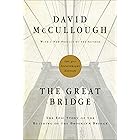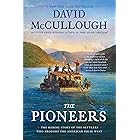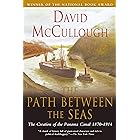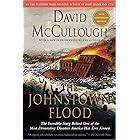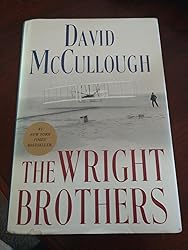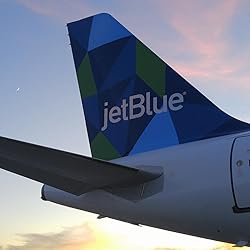| Print List Price: | $18.99 |
| Kindle Price: | $13.99 Save $5.00 (26%) |
| Sold by: | Simon and Schuster Digital Sales LLC Price set by seller. |
Your Memberships & Subscriptions

Download the free Kindle app and start reading Kindle books instantly on your smartphone, tablet, or computer - no Kindle device required.
Read instantly on your browser with Kindle for Web.
Using your mobile phone camera - scan the code below and download the Kindle app.





 Audible sample Sample
Audible sample Sample 


Follow the author
OK
The Wright Brothers Kindle Edition
On a winter day in 1903, in the Outer Banks of North Carolina, two brothers—bicycle mechanics from Dayton, Ohio—changed history. But it would take the world some time to believe that the age of flight had begun, with the first powered machine carrying a pilot.
Orville and Wilbur Wright were men of exceptional courage and determination, and of far-ranging intellectual interests and ceaseless curiosity. When they worked together, no problem seemed to be insurmountable. Wilbur was unquestionably a genius. Orville had such mechanical ingenuity as few had ever seen. That they had no more than a public high school education and little money never stopped them in their mission to take to the air. Nothing did, not even the self-evident reality that every time they took off, they risked being killed.
In this “enjoyable, fast-paced tale” (The Economist), master historian David McCullough “shows as never before how two Ohio boys from a remarkable family taught the world to fly” (The Washington Post) and “captures the marvel of what the Wrights accomplished” (The Wall Street Journal). He draws on the extensive Wright family papers to profile not only the brothers but their sister, Katharine, without whom things might well have gone differently for them. Essential reading, this is “a story of timeless importance, told with uncommon empathy and fluency…about what might be the most astonishing feat mankind has ever accomplished…The Wright Brothers soars” (The New York Times Book Review).
- LanguageEnglish
- PublisherSimon & Schuster
- Publication dateMay 5, 2015
- File size38930 KB
Customers who bought this item also bought
 “All the money anyone needs is just enough to prevent one from being a burden to others.”Highlighted by 1,274 Kindle readers
“All the money anyone needs is just enough to prevent one from being a burden to others.”Highlighted by 1,274 Kindle readers All the money anyone needs is just enough to prevent one from being a burden on others.Highlighted by 1,216 Kindle readers
All the money anyone needs is just enough to prevent one from being a burden on others.Highlighted by 1,216 Kindle readers It wasn’t luck that made them fly; it was hard work and common sense; they put their whole heart and soul and all their energy into an idea and they had the faith.Highlighted by 1,126 Kindle readers
It wasn’t luck that made them fly; it was hard work and common sense; they put their whole heart and soul and all their energy into an idea and they had the faith.Highlighted by 1,126 Kindle readers
Editorial Reviews
Amazon.com Review
An Amazon Best Book of May 2015: Most people recognize the famous black-and-white photo of the Wright brothers on a winter day in 1903, in a remote spot called Kitty Hawk, when they secured their place in history as the first to fly a motor-powered airplane. That brilliant moment is the cornerstone of the new masterful book by Pulitzer Prize-winning historian David McCullough, who brings his deft touch with language and his eye for humanizing details to the unusually close relationship between a pair of brothers from Dayton, Ohio, who changed aviation history. Bicycle shop owners by day, Wilbur and Orville taught themselves flight theory through correspondence with the Smithsonian and other experts. But the brothers soon realized that theory was no match for practical testing, and they repeatedly risked life and limb in pursuit of their goal—including when Orville fractured a leg and four ribs in a 75-foot plunge to the ground. McCullough’s narration of ventures such as this—their famous first flight at Kitty Hawk; the flight in Le Mans, France that propelled the brothers to international fame; the protracted patent battles back at home; and the early death of elder brother Wilbur—will immerse readers in the lives of the Wright family. Like other great biographies before it, The Wright Brothers tells the story about the individuals behind the great moments in history, while never sacrificing beauty in language and reverence in tone. – Manfred Collado
Review
“David McCullough has etched a brisk, admiring portrait of the modest, hardworking Ohioans who designed an airplane in their bicycle shop and solved the mystery of flight on the sands of Kitty Hawk, N.C. He captures the marvel of what the Wrights accomplished and, just as important, the wonder felt by their contemporaries. . . . Mr. McCullough is in his element writing about seemingly ordinary folk steeped in the cardinal American virtues—self-reliance and can-do resourcefulness.” (Roger Lowenstein The Wall Street Journal)
“[McCullough] takes the Wrights’ story aloft. . . . Concise, exciting, and fact-packed. . . . Mr. McCullough presents all this with dignified panache, and with detail so granular you may wonder how it was all collected.” (Janet Maslin The New York Times)
"McCullough’s magical account of [the Wright Brothers'] early adventures — enhanced by volumes of family correspondence, written records, and his own deep understanding of the country and the era — shows as never before how two Ohio boys from a remarkable family taught the world to fly." (Reeve Lindbergh The Washington Post)
“David McCullough’s The Wright Brothers is a story about two brothers and one incredible moment in American history. But it’s also a story that resonates with anyone who believes deeply in the power of technology to change lives – and the resistance some have to new innovations.” (Sundar Pichai, CEO of Google )
"A concise yet engaging biography. . . . With his ear for dialect and eye for detail, McCullough puts the Wrights in historical context, flushed out by vivid portraits of their loyal father and sister. . . . To learn history from a master storyteller is to relive the past." (Bruce Watson The San Francisco Chronicle)
"An outstanding saga of the lives of two men who left such a giant footprint on our modern age." (Booklist (starred review))
“[An] enjoyable, fast-paced tale. . . . A fun, fast ride.” (The Economist)
"[A] fluently rendered, skillfully focused study. . . . An educational and inspiring biography of seminal American innovators." (Kirkus Reviews)
"McCullough's usual warm, evocative prose makes for an absorbing narrative; he conveys both the drama of the birth of flight and the homespun genius of America's golden age of innovation." (Publishers Weekly)
"McCullough shows the Wright brothers (snubbed by the British as mere bicycle mechanics) for the important technoscientists they were. . . . This work is their greast, eminently readable story." (Choice)
“One of our Nation's most distinguished and honored historians, David McCullough has taken his own place in American history. . . . The United States honors David McCullough for his lifelong efforts to document the people, places, and events that have shaped America.” (From The Presidential Medal of Freedom Citation)
About the Author
Excerpt. © Reprinted by permission. All rights reserved.
Product details
- ASIN : B00LD1RWP6
- Publisher : Simon & Schuster; Reprint edition (May 5, 2015)
- Publication date : May 5, 2015
- Language : English
- File size : 38930 KB
- Text-to-Speech : Enabled
- Screen Reader : Supported
- Enhanced typesetting : Enabled
- X-Ray : Enabled
- Word Wise : Enabled
- Sticky notes : On Kindle Scribe
- Print length : 337 pages
- Best Sellers Rank: #56,300 in Kindle Store (See Top 100 in Kindle Store)
- Customer Reviews:
About the author

David McCullough has twice received the Pulitzer Prize, for Truman and John Adams, and twice received the National Book Award, for The Path Between the Seas and Mornings on Horseback; His other widely praised books are 1776, Brave Companions, The Great Bridge, and The Johnstown Flood. He has been honored with the National Book Foundation Distinguished Contribution to American Letters Award, the National Humanities Medal, and the Presidential Medal of Freedom.
Customer reviews
Customer Reviews, including Product Star Ratings help customers to learn more about the product and decide whether it is the right product for them.
To calculate the overall star rating and percentage breakdown by star, we don’t use a simple average. Instead, our system considers things like how recent a review is and if the reviewer bought the item on Amazon. It also analyzed reviews to verify trustworthiness.
Learn more how customers reviews work on AmazonReviews with images
-
Top reviews
Top reviews from the United States
There was a problem filtering reviews right now. Please try again later.
You can easily see that if flight had not come about, not only would all our lives have been different, some of us might never have been!
David McCullough has brought us a wonderful popular history, a survey, of the Wright Brothers and their bringing flight to the world. Yes, others are still put forward as having beaten them to the air, but as one of their early rivals noted, no one seemed to be able to fly until Wilbur showed them how then everyone could do it. All the other claimants are for getting off the ground for a bit, but not for controlled flight as the Wright Brothers accomplished.
This book covers their early life through their ten years of inventing flight, their 1903 flight at Kitty Hawk, their flights at Huffman Prairie, their 1908 paper, the work Orville did with contracts to the U.S. Government and Wilbur’s work and exhibitions in France. Yes, there were rivalries, jealousies, claims for credit. But the reality in the final analysis is that Wilbur and Orville did this great thing with their high school educations and completely financed it themselves without any outside money from wealthy folks or the government.
The book is an entertaining and informative read with lots of photos. But if you get interested in the subject you can supplement this book with lots of fabulous information on the web and videos done about the Wright Brothers by people who actually knew them!
Wilbur died far too young and Orville lived through WWII and saddened to see their great gift to the world become the means of delivering death and horror in war.
Still, my life has been blessed by flight. Last year I took my four year old granddaughter, Amelia, to the Ann Arbor City Airport and we watched planes land and take off as I explained flight to her. She was fascinated. She charmed a very nice man who was the pilot of a Lear Jet that was getting ready to leave in a few hours. He invited her to wander around the inside of the jet to see how it looked inside. She was DELIGHTED. I was so happy to see flight beginning to bless her life and pique her curiosity, too! I bought her a model of the Wright Flyer and gave it to her Dad so they could build it together. They did and it is proudly in her room.
A great thing. And we owe it to Wilbur and Orville and what they began back in December 1903 at Kitty Hawk, North Carolina!
Reviewed by Craig Matteson, Saline, MI
FAMILY
McCullough makes it clear that the Wilbur and Orville were a product of their family environment. Their father was the major influence. Milton Wright was a minister and finally a bishop in the United Brethren Church in Christ.
McCullough writes — “He was an unyielding abstainer, which was rare on the frontier, a man of rectitude and purpose— all of which could have served as a description of Milton himself and Wilbur and Orville as well.”
His strict values molded and focused the views of the three younger Wrights (Katherine, Wilbur, and Orville). In addition to his strictness, he was a true classical liberal in his beliefs in the scientific method and equal rights for all people, no matter their race or gender. For example, Milton wrote to his sons when they were in Paris trying to get support for their flying machine: “Sons—Be men of the highest types personally, mentally, morally, and spiritually. Be clean, temperate, sober minded, and great souled.” As grown, experienced, and highly successful inventors, they responded: “Father — All the wine I have tasted since leaving home would not fill a single wine glass. I am sure that Orville and myself will do nothing that will disgrace the training we received from you and Mother.”
McCullough writes — “Years later, a friend told Orville that he and his brother would always stand as an example of how far Americans with no special advantages could advance in the world. ‘But it isn’t true,’ Orville responded emphatically, ‘to say we had no special advantages . . . the greatest thing in our favor was growing up in a family where there was always much encouragement to intellectual curiosity.’ ”
BUSINESS
McCullough records Wilbur’s thoughts on being in business in a letter to his brother Lorin in 1894:
“In business it is the aggressive man, who continually has his eye on his own interest, who succeeds. … There is nothing reprehensible in an aggressive disposition, so long as it is not carried to excess, for such men make the world and its affairs move. . . . I entirely agree that the boys of the Wright family are all lacking in determination and push. That is the very reason that none of us have been or will be more than ordinary businessmen. … We ought not to have been businessmen.”
In 1911, Wilbur wrote:
“When we think what we might have accomplished if we had been able to devote this time [fighting patent infringement suits] to experiments, we feel very sad, but it is always easier to deal with things than with men, and no one can direct his life entirely as he would choose.”
The Wrights never built, or even tried to build, an industrial empire as Ford or Edison or their Dayton neighbors John and Frank Patterson (National Cash Register) had done. The Wrights were intellectual men and women.
ENGINEERING
McCullough's book is quite light on technical discussions. But the Wrights' unique approach to technology development is the essence of who they were and why they were such successful engineers when others better funded, better educated, and better connected failed. For example, McCullough ignored the following examples.
Wilbur and Orville were superb engineers, though neither went beyond high school. They found by trial and error that the existing data held by the science of aeronautics was flawed even though its principles were generally correct. They zeroed in on weight, power, control, lift, and the propeller as the main technologies that had to be solved. What is so astounding is not just that they solved these technical problems and reduced them to practice, but that they did it in record time. In a matter of three years, they invented or reinvented virtually the whole field of aeronautics. For example, the wind tunnel had been invented thirty years before, but Wilbur and Orville developed it into a precise quantitative instrument. With it, they developed not just the wing configurations, but coupled with the understanding that a propeller is simply a wing on a rotating shaft, they rewrote the rules of propeller design and optimized its efficiency dramatically. These two men had an insight into, and a reverence for, quantitative empirical data that was unique in aeronautical engineering at that time.
McCullough shows how that reverence for truth (data) grew out of their family standards. But there was more to it than the principles of a strict Protestant upbringing. It also has to do with time and place. The late 1800s and early 1900s was a period of great minds applying the rules of The Enlightenment and the experience of science to practical problems. The place was an industrial axis, which was anchored by Dayton and Detroit and included Flint, Toledo, Cleveland, Pittsburgh, Cincinnati, and many other cities in the Midwest. This is where Edison, Ford, Dow, Firestone, the Patterson Brothers, and the Wright Brothers lived and created their technologies. There was a culture of boundless innovation and an infrastructure that included materials and support equipment that fostered great invention. It was similar in many ways to Silicon Valley today.
REINFORCE THE NARRATIVE
Another area that could be strengthened in the book is its niche. There has been so much written about the Wrights that each new book needs to distinguish itself in some way with a different point of view, a new set of facts, or a fresh interpretation of old facts.
For example, McCullough writes — “In early 1889, while still in high school, Orville started his own print shop in the carriage shed behind the house, and apparently with no objections from the Bishop. Interested in printing for some while, Orville had worked for two summers as an apprentice at a local print shop. He designed and built his own press using a discarded tombstone, a buggy spring, and scrap metal.”
That last sentence about building his own printing press defines so much about Orville and his simple pragmatism. To reinforce that point requires some expansion of that event or similar other defining events in the lives of Wilbur and Orville. I wanted to read more about Orville's compulsive act of invention, but it wasn't there.
The 81 photos McCullough includes in his book are treasures. Many of them are familiar, but so many are new looks at the Wrights. I wish there were greatly expanded captions below each photo, for each one is a story in itself.
One source of knowledge about the Wrights’ approach to aeronautics is the Air Force Museum at Wright-Patterson Air Force Base in Dayton. It is normally overshadowed by the more popular Air and Space Museum in Washington, but the exhibits at the Air Force Museum walk you through the Wrights’ engineering exploits with a degree of detail and insight I have found nowhere else.
Top reviews from other countries
Two things surprised me, though. One was the anti-semitism that their sister expressed when hearing of Hart Berg, the reprentative of Flint and Company, who would eventually reprensent them, and two, was their fates in the end. Somehow both these elements seemed out of character. The Wright Brothers, themselves, were peculiar, however. It seems neither ever had as much as a girlfriend, at least from the story McCullough tells, and one has to wonder why that was. They lived at home their entire lives, along with their sister, who likewise seems to have avoided the opposite sex for most of her life. McCullough doesn't dwell on this, but it does seem a bit strange. But I suppose genius is often found in madness.
But it's a truly fascinating, incredibly American tale, and well worth a read.




